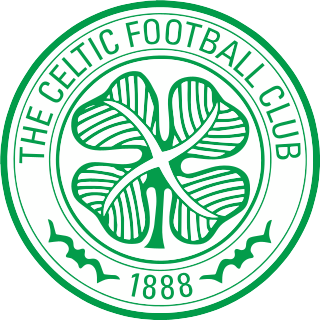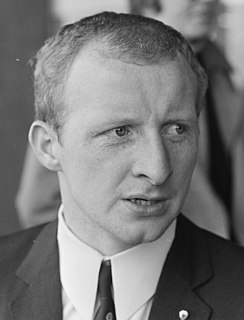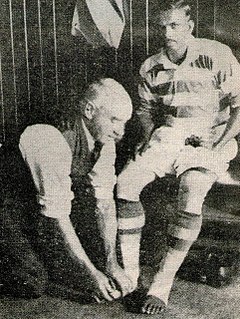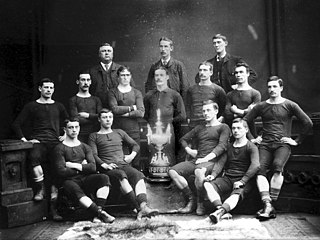
The Celtic Football Club, commonly known as Celtic, is a Scottish professional football club based in Glasgow, which plays in the Scottish Premiership. The club was founded in 1887 with the purpose of alleviating poverty in the immigrant Irish population in the East End of Glasgow. They played their first match in May 1888, a friendly match against Rangers which Celtic won 5–2. Celtic established themselves within Scottish football, winning six successive league titles during the first decade of the 20th century. The club enjoyed their greatest successes during the 1960s and 70s under Jock Stein, when they won nine consecutive league titles and the 1967 European Cup. Celtic have played in green and white throughout their history, adopting hoops in 1903, which have been used ever since.

The Old Firm is the collective name for the Scottish football clubs Celtic and Rangers, which are both based in Glasgow. The two clubs are by far the most successful and popular in Scotland, and the rivalry between them has become deeply embedded in Scottish culture. It has reflected, and contributed to, political, social, and religious division and sectarianism in Scotland. As a result, the fixture has had an enduring appeal around the world.

Celtic Park is the home stadium of Celtic Football Club, in the Parkhead area of Glasgow, Scotland. With a capacity of 60,411, it is the largest football stadium in Scotland, and the eighth-largest stadium in the United Kingdom. It is also known as Parkhead or Paradise.

James Connolly Johnstone was a Scottish footballer who played as an outside right. Known as "Jinky" for his elusive dribbling style, Johnstone played for Celtic for 13 years, and was part of the 'Lisbon Lions', the team who won the 1967 European Cup Final, as well as winning nine consecutive Scottish championships. He scored 129 goals for Celtic in 515 appearances and was voted the club's greatest ever player by fans in 2002.
Paul Michael Lyons McStay,, nicknamed the Maestro, is a Scottish former professional footballer who spent his entire career with Celtic, making his senior debut in 1982 and retiring in 1997. He captained both Scotland and Celtic at all age levels. He was capped 76 times for his country and scored nine goals. He helped Celtic win three league titles, the last in 1988.

The Scottish Football Association Challenge Cup, commonly known as the Scottish Cup, is an annual association football knock-out cup competition for men's football clubs in Scotland. The competition was first held in 1873–74. Entry is open to all 122 clubs with full membership of the Scottish Football Association (SFA), along with up to eight other clubs who are associate members.

James Quinn was a Scottish footballer who played for Celtic for 15 years, becoming one of the club's leading goalscorers of all time. He also represented Scotland.
James Farry served as chief executive of the Scottish Football Association from 1990 to 1999. Farry was forced to leave that post due to a dispute with Celtic over the registration of player Jorge Cadete.

James McMenamin, usually known as Jimmy McMenemy, was a Scottish footballer who most notably played for Celtic from 1902 to 1920 and later served as assistant manager in the 1930s. He has been described by the club as "a true Celtic legend".

Thomas Gemmell was a Scottish football player and manager. Although right-footed, he excelled as a left-sided fullback and had powerful shooting ability. Gemmell is best known as one of the Celtic side who won the 1966–67 European Cup; he scored the first Celtic goal in the final. Gemmell played 18 times for Scotland, and also played for Nottingham Forest, Miami Toros and Dundee. After retiring as a player in 1977, Gemmell managed Dundee and Albion Rovers.

Lesser Hampden is a football stadium in Mount Florida, Glasgow, Scotland, which is located immediately beside the western end of Hampden Park stadium.
The Scottish Youth Cup is an annual Scottish football competition run by the Scottish Football Association for under-18 teams, previously under-19 teams. The competition started in 1983–84 and is open to all clubs in full membership of SFA.

James Anthony Kelly is a Scottish politician who has served as General Secretary of the Scottish Labour Party since 2021. He was a Member of the Scottish Parliament (MSP) for the Glasgow region between 2016 and 2021, having previously been MSP for Rutherglen from 2007 to 2016.

This article lists Scottish football attendance records under the categories listed below. The highest ever attendance for a UEFA competition match was in the 1969–70 European Cup semi-final at Hampden Park, Scotland's national stadium. A record 136,505 people attended the match between Celtic and Leeds United. The attendance of 149,415 for the Scotland vs. England international match of 1937 at Hampden Park is also a European record. The attendance of 147,365 for the 1937 Scottish Cup Final between Celtic and Aberdeen at Hampden Park is a European record for a club match. Rangers' record attendance of 118,567 at Ibrox is a British record for a league match.
The 1932–33 Scottish Cup was the 55th staging of Scotland's most prestigious football knockout competition. The Cup was won by Celtic who defeated Motherwell in the final.
The Glasgow Cup is a football tournament open to teams from Glasgow, Scotland. Operated by the Glasgow Football Association, it was competed for annually by senior Glasgow clubs from 1887 until 1989. It is now competed for between the senior teams of Clyde, Partick Thistle and Queen's Park and the youth teams of Celtic and Rangers, and has used both knockout and round robin formats to determine the finalists.
The 1888 Scottish Cup final played at the second Hampden Park in Crosshill on 4 February 1888 was won by Renton, who beat Cambuslang 6–1.
Brian Dempsey is a Scottish businessman. Dempsey currently lives in Scotland after brief spells in Miami and the Caribbean He was a major funder of the Scottish Labour Party and a briefly director of Celtic FC in 1990. He supported Fergus McCann's efforts to take over Celtic in the 1990s. He was declared bankrupt in June 2011, with debts in excess of £10 million.

The Glasgow Merchants' Charity Cup was a knockout football tournament open to teams from in and around Glasgow and later on in the tournament's history, teams from outwith Glasgow. Invitations were made and sent out by the Glasgow Charity Cup Committee (GCCC) at their discretion, but no criteria were ever published.
William Hannah Miller was a Scottish footballer who played as a centre half for Hibernian.
















